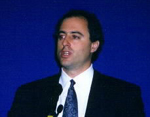The worlds of sport, politics and business – never easy bedfellows – are set to collide in the months leading up to the Olympics. Last week ministers and media rowed over the true cost of the Games, with the government playing down reports that the sum is north of £12bn. The budget is £9.3bn, £7bn of which has been spent on regenerating east London, previously one of Europe’s poorest areas. Soon the focus will switch to economic benefits. Barcelona’s GDP grew by 2.9% following the 1992 Olympics, and Sydney’s by 2.1% after the 2000 Games.
In the seven years since London was awarded the Games, the Olympic Park Legacy Company’s preparations for this summer’s show have gone pretty well. Sure, there have been setbacks, but with just 25 weeks to go until the opening ceremony, the OPLC team led by chief executive Andrew Altman, finds itself in – potentially – a medal-winning position.
Races are won or lost in the final straight, however. The spotlight will intensify and the idealistic vision of legacy will soon become reality.
Meanwhile, the scope of the OPLC is about to get a whole lot bigger.
Later this year a new Mayoral Development Corporation will replace the OPLC, with Altman at its helm. The OPLC will form the core of the corporation with all “properties, rights and liabilities” transferring across. But the new body’s remit stretches beyond the park to the Stratford City development site, which includes the Westfield Shopping Centre and Chobham Farm, Hackney Wick and Fish Island.
As well as growing geographically, it will take on new functions, and the Olympic Delivery Authority’s planning decisions team will also come under its wing.
If, once the Olympic and Paralympic circuses have left town in September, the MDC is in good shape, it will be down in no small part to the work carried out during the crucial period between the turn of the year and Easter.
Altman is pleased with how the Olympic year has started.
You may recall the slightly odd photos of the Cabinet meeting at the handball arena a couple of weeks ago; more important, however, was the parallel announcement that operators for the bulk of the permanent Olympic venues have been appointed.
Behind the scenes, responsibility for the park has switched from the Olympic Delivery Authority to LOCOG, beginning a chain of events that will see it handed over to the OPLC/MDC in October.
Altman says: “It has been great to start off the year with the prime minister and the Cabinet on the park and to be able to announce our operators for the aquatics centre, the multi-use arena, the Orbit and the park. This means that six out of the eight venues on the park have now secured legacy, which is fantastic.
“That’s far ahead of where any other host city has been, and there’s still six months to go before the Games. But there are big challenges to overcome.”
These challenges include securing a tenant for the broadcast and media centre, the giant shed that has always had the clearest potential to be labelled a white elephant. “We’re really keen to land that anchor tenant and we have a lot of work to do to make that happen,” says Altman.
Three consortiums – spanning technology, fashion and sport – are on the shortlist: the UK Fashion Hub, backed by Revolution Property, the Decathlon Sports-backed Oxylane Group, and iCity, a bid influenced by Tech City.
If, on the face of it, iCity appears to most meet the ambitions of legacy – the delivery of thousands of “high quality” local jobs and training opportunities, and support for the government’s plan for a tech city stretching from the Square Mile to Stratford – it is far from in the bag.
“These are challenging buildings, let’s be honest about that,” says Altman. “The broadcast centre is 600,000 sq ft, the press centre another 300,000 sq ft. But we have three bidders right now that we’re taking forward. All offer something very exciting to work with.
“We have to have really serious negotiations around commitments to tenants, on financials and around making sure that they can deliver. We hope to be able to do that before the Games. We’re going to push very hard to make one of what I think are very exciting concepts emerge as a real anchor for the park.”
That is the seventh of the eight assets; the eighth is the stadium. And here there could be a surprising result.
“We feel good about the stadium, because we’ve won the 2017 World Athletics Championship bid, so we know that there’s a great athletics legacy here,” says Altman.
“It’s a new national centre for athletics, but obviously we want more uses. So, we’re now getting interest to make it multi-use, multi-sport.”
West Ham’s stadium deal collapsed last October and the football club is among 16 parties to have registered interest in taking a long lease on the stadium after the Games. But this does not mean soccer at the stadium is a given.
“Of course, we are very interested in having football as a tenant but it’s not the only opportunity,” says Altman. “Right now we’re in the process of getting as many interests as we can to make this a vibrant, multi-sport stadium. By May, I hope to have some decisions.”
A national sports stadium without football at its heart would be the most surprising legacy of all.
For more, read Nick Whitten’s Olympics blog at www.estatesgazette.com/blogs/olympics. To watch the interview with Altman at the LSH ski challenge go to estatesgazette.com/videos











